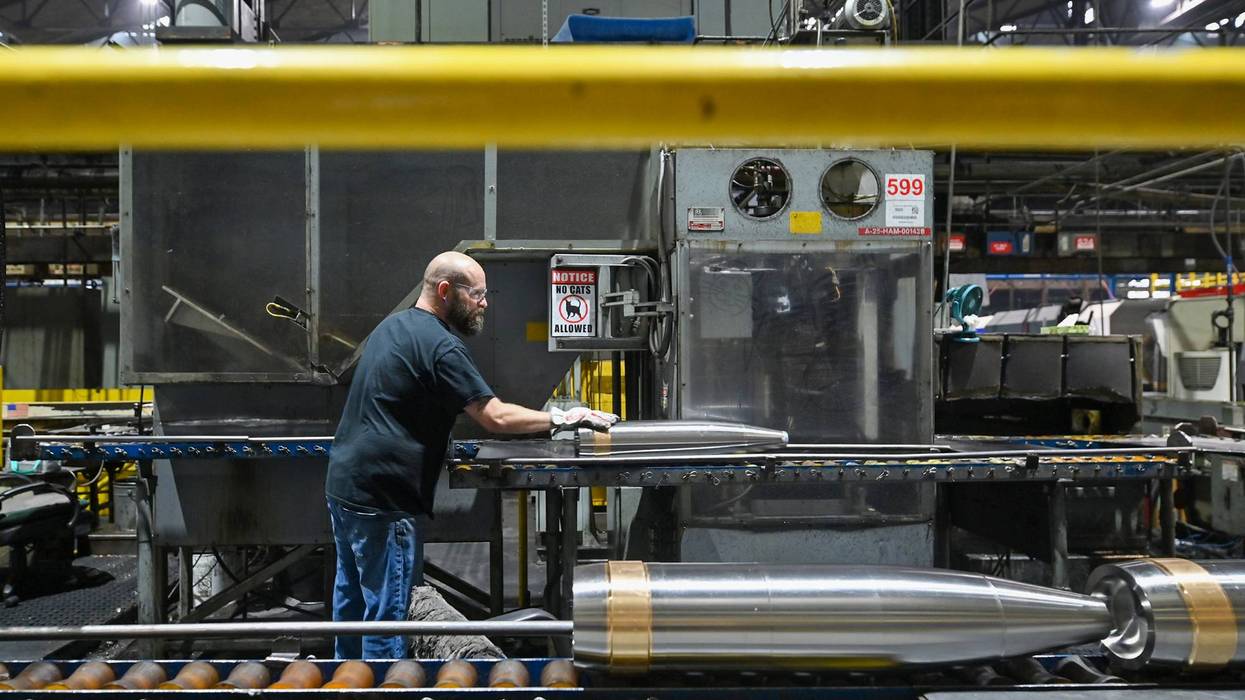Do the Democrats Have the Guts to Outflank Trump on Defense Industry Looting?
The Democrats could push Trump—or go around him to make better inroads with working people—but will they dare to take that leap? One would hope so, but don’t hold your breath.
Trump has decided that the government should not give money to defense contractors who then reroute our tax dollars via stock buybacks to stockholders and executives.
A stock buyback, for those unfamiliar, is when a corporation repurchases its own shares, thus boosting the share’s price, a legalized form of stock manipulation. CEOs, who are paid mostly in stock incentives, and large investors directly benefit from stock buybacks, and unlike with dividends, don’t have to pay taxes until they sell their shares.
In the weapons industry, this isn’t news. Studies show that defense contractors spent three times more on dividends and stock buybacks than on capital investments needed to fulfill their contracts over the last decade. In Europe, it was the other way around with defense companies spending twice as much on capital investments compared to dividends. (They don’t do stock buybacks.)
The New York Times cited a Department of Defense study during the Biden administration that “found that top US defense contractors spent more on returning cash to shareholders in the form of dividends and stock buybacks between 2010 and 2019 compared to the previous decades, while spending on research and new or upgraded factories had declined.”
You’ve got to wonder why the Biden administration didn’t try to stop this scam. Maybe it feared looking anti-military. Or maybe it thought such an action would be too upsetting to their Wall Street donors who feast on stock buybacks?
Now we have Trump doing what the Democrats should have done long ago, announcing he will stop buybacks and cap executive salaries at profligate defense contractors:
- His Executive Order directs the Secretary of War to take steps to ensure that future contracts prohibit stock buybacks and corporate distributions during periods of underperformance, non-compliance, insufficient prioritization or investment, or insufficient production speed.
- The Secretary shall further take steps to ensure that future contracts permit the Secretary to, upon determining that a contractor is experiencing such issues, cap executive base salaries at current levels (with inflation adjustments permitted) while scrutinizing executive incentives to ensure they are directly, fairly, and tightly tied to prioritizing the needs of the warfighter.
How about Preventing Mass Layoffs?
If the Democrats wanted to show more concern for working people they would jump all over this executive order and push legislation to expand it to include a prohibition of compulsory layoffs at all defense contractors. If a contractor wants to change staffing levels, they should offer voluntary financial buyout packages. No one should be forced to leave.
This is an easy case to make. Why should taxpayers give money to corporations that then lay off taxpayers so that they can shovel more and more of our tax dollars to the wealthy? If the problem is that these defense contractors fail to deliver products on time they need more workers, not fewer.
Instead of wallowing in the Epstein files, the Democrats should declare again and again that mass layoffs are the weapon of choice to enrich executives and Wall Street. Fight for the damn jobs!
In April, the Labor Institute, in cooperation with the Center for Working Class Politics, produced a YouGov survey of 3,000 voters in Michigan, Ohio, Pennsylvania, and Wisconsin. In the survey, we asked voters to evaluate a state ballot initiative we invented that read:
“Corporations with more than 500 employees that receive taxpayer-funded federal contracts are prohibited from conducting involuntary layoffs of American workers. All layoffs during the life of a taxpayer-funded contract must be voluntary, based on employer financial incentives. No one shall be forced to leave.”
Overall, 42 percent supported the proposal, while 26 percent opposed it and 32 percent were not sure. The no-layoff proposal was brand new, unheard of by anyone before the survey was administered, yet it tied for fifth in popularity among 25 economic proposals. Furthermore, we reported that:
“Respondents from key demographic groups that Democrats have struggled to reach in recent electoral cycles showed robust support for the policy, which was tied for fifth among respondents without a four-year college degree and those whose family income was less than $50,000 per year, and tied for sixth among respondents who reported a declining standard of living and those who live in rural areas and small towns.”
This no-layoffs policy would be a big winner for the Democrats leading up to the mid-terms. But it would not be a winner for the financial backers of the party who cherish their stock buybacks.
So here we are again. Trump outflanking the Democrats on a populist economic proposal, like cancelling NAFTA, one that the Democrats failed to address while in power. In this case, the Democrats could push Trump even further by tying job stability to federal defense contracts, something that working people would greatly value but would be upsetting to Wall Street.
The Democrats could push Trump, but will they dare to take that leap? One would hope so, but don’t hold your breath.
The failure to rigorously defend working people over the last forty years against needless mass layoffs may be why so many voters right now are willing to consider a new political party, independent of the two billionaire parties.
Much more on that to come.


